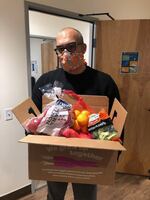With the spread of coronavirus in the Pacific Northwest, many health care and social services have shifted more toward telemedicine and virtual support in order to maintain social distancing.
That includes the Cascade AIDS Project, which has been providing HIV services and advocacy in the Pacific Northwest since the 1980s. Since the pandemic began, the organization has largely shifted away from providing in-person services in favor of giving support by phone, email and telehealth.
Tyler TerMeer, the group's chief executive officer, told OPB’s “All Things Considered” that its work is geared toward creating access to services for people who need them, no matter what's happening in the world around them.

Tyler TerMeer, the CEO of the Cascade AIDS Project, helps prepare food donations for at-risk patients.
Courtesy of the Cascade AIDS Project
In addition to HIV and sexually transmitted infection screening and support services, CAP also provides social services for people living with HIV, including rent assistance, help addressing food insecurity, and making sure unhoused people with HIV stay connected. Those have become even more important amid the economic fallout of the coronavirus pandemic. On the health care front, the organization has worked on making sure home HIV test kits and safer-sex supplies are available to community members, despite the in-person separation. They’ve also begun to provide COVID-19 testing.
“[We recognized] that people who we currently serve and members of the broader LGBTQ+ community and beyond would need access to COVID-19 testing,” TerMeer said, “and that we could offer that to the people that we serve but do it in a culturally affirming way.”
TerMeer acknowledged that transitioning to a telehealth model was difficult. “When I made the decision that we were going to this new model, it is in some ways such a far step away from who we are under our mission of an organization,” TerMeer said. “We built Cascade AIDS Project on the ability to provide in-person, compassionate, trauma-informed, client-centered care.”
TerMeer said while group leaders recognize that going virtual is not ideal, the services they provide are vital, and thus need to continue by any means available.
The mental health impacts of the pandemic on people living with HIV, as well as the LGBTQ community, is another concern. TerMeer acknowledged that people in those communities, global pandemic aside, have a long history of trauma and isolation.
“This time of being back in a period of isolation where they can’t have that social connection is very difficult for some of them. They are perhaps on their own, and their only outlet for social connection had been coming to see us for our social service programs, or for our social support program where they met with their peers,” TerMeer said.
Post-traumatic stress has been triggered by current events, especially for some long-term HIV survivors or members of the LGBTQ community who served as caretakers during the early years of the HIV epidemic.
“They’re reliving a very difficult chapter of their life where people were sick and dying around them,” TerMeer said.
The recent death of AIDS activist and Act Up founder Larry Kramer has brought that era of the HIV epidemic back into the national spotlight, in the context of current events. But as TerMeer and his colleagues have heard from some members of CAP's "Aging Well" support group, the recent comparisons of the coronavirus pandemic and the HIV epidemic are not helpful. In fact, many would highlight the stark differences between the two.
During those early days of the epidemic, "you didn't see a front-page New York Times article that talked about the 100,000 deaths in the community. That happened years into the epidemic of HIV, and was page 18 news," TerMeer said.
Long-term HIV survivors are sometimes put off by the comparison, he said, because society didn’t respond to and care about the LGBTQ community in the same way back then, as people living through the epidemic faced stigma, discrimination and fear.
“It was really LGBTQ people and their friends and their family that had to start a revolution, that started a movement that allowed us to get us to where we’re at today in the HIV movement. It wasn’t a societal shift, a societal shutdown that got us to this point,” TerMeer said.
In all of the Cascade AIDS Project's current priorities — addressing trauma and PTSD, providing essential healthcare and financial assistance, maintaining social connections — TerMeer added that racial equity is kept front and center. From discussions about data collection and contact tracing to considering how face coverings have in the past put some people of color at risk of being profiled, TerMeer said CAP is putting a racial justice framework on all its conversations about COVID-19.
“There should be nothing about us, without us," TerMeer said. "That’s how the HIV movement was built, and that’s how public health crises should be addressed,” TerMeer said.
For more information about the Cascade AIDS Project's response to COVID-19, visit this web page.
To hear the entire conversation with Tyler TerMeer, use the audio player at the top of this page.